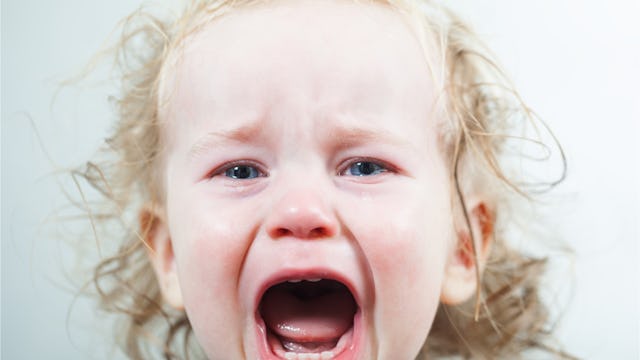There Is Evidence To Support The Link Between Your Kid's Behavior And Their Gut Bacteria

At this very moment, chances are your toddler is throwing a fit. Because toddlers. I have a 3-year-old, and she’s throwing a fit as I write this sentence because her cheese slice broke.
Toddlers and fits are synonymous.
However, there is a recent study from The Ohio State University that is sparking the idea that moodiness might not simply be only your toddler’s developing brain. It might have something to do with what’s going on in their gut. OSU researchers studied microbes in the guts of children between the ages of 18 and 27 months. They found that the abundance and diversity of particular bacteria impact behavior. Mostly in boys.
The original goal of the study was not to find a cure for my toddler’s tantrum problem, but to find some clues as to where chronic illnesses like obesity, asthma, allergies, and bowel disease start. What they found was evidence that what’s going on in the gut can really impact a young child’s mood.
Naturally, this was a preliminary study. I doubt that OSU will soon be manufacturing some magical mix of gut juice that can solve all of our toddler problems. But perhaps this might lead to something that will ease the pain of living with a toddler.
Maybe.
Hopefully.
Please, God!
Sadly, we are not there. In fact, right now it sounds like a chicken or egg sort of thing. Michael Bailey, PhD, a researcher with Nationwide Children’s Hospital and co-author of the OSU study, says, “There is definitely communication between bacteria in the gut and the brain, but we don’t know which one starts the conversation. Maybe kids who are more outgoing have fewer stress hormones impacting their gut than shy kids. Or maybe the bacteria are helping mitigate the production of stress hormones when the child encounters something new. It could be a combination of both.”
What this all boils down to is that science found a connection between mood and what’s going on in a child’s gut. Now we wait. If you have a toddler in the house, this probably won’t help you much. I know that when my toddler get’s hangry, I feed her. That tends to help. Or she throws the food on the floor. But ultimately, that’s all I can do at this point.
Perhaps, in the future, there might be a solution to the problem of the moody toddler, but I doubt it will benefit me personally. I will be well out of the toddler stage by then, and I’m not going back.
However, what could benefit me more is that this study might also lead to better mental health treatment in adults, and that’s huge. Looking at what is going on in the gut, and associating it with a person’s mood is a new, but growing science. In fact, the New York Times recently devoted a full article to the subject. They write: “Micro-organisms in our gut secrete a profound number of chemicals, and researchers like Lyte have found that among those chemicals are the same substances used by our neurons to communicate and regulate mood, like dopamine, serotonin and gamma-aminobutyric acid (GABA). These, in turn, appear to play a function in intestinal disorders, which coincide with high levels of major depression and anxiety.”
To be honest, as someone who has struggled with anxiety and depression for most of my life, I’m pretty excited to see where these studies lead — particularly when I consider that my parents suffered from the same disorders, and there is a decent chance that my children will too. So while the OSU study might only focus on toddlers, I think anyone struggling with depression and anxiety should be optimistic that that this study will feed into the larger conversation of mental health treatments and advancements.
But if all else fails, it sounds like they might simply be on the path to finding a cure for the threenager, which in my opinion, may be the greatest gift science could ever give to mankind.
This article was originally published on